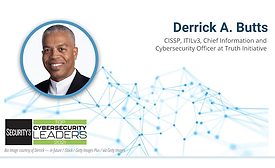Cybersecurity News
Special Report
2021 Top Cybersecurity Leaders - Derrick A. Butts
CISSP, ITILv3, Chief Information and Cybersecurity Officer at Truth Initiative
March 1, 2021
Sign-up to receive top management & result-driven techniques in the industry.
Join over 20,000+ industry leaders who receive our premium content.
SIGN UP TODAY!Copyright ©2024. All Rights Reserved BNP Media.
Design, CMS, Hosting & Web Development :: ePublishing








